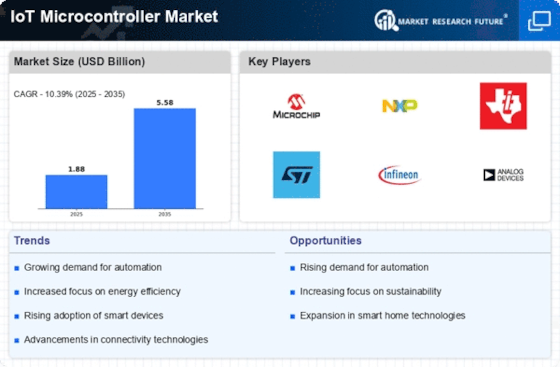Top Industry Leaders in the IoT Microcontroller Market

Competitive Landscape of the IoT Microcontroller Market:
The Internet of Things (IoT) is rapidly transforming the world, and at its core lies the humble yet powerful IoT microcontroller. These tiny brains control and process data in countless devices, from wearables and smart homes to industrial automation and connected vehicles. As the IoT explodes, so does the demand for MCUs, leading to a vibrant and dynamic competitive landscape.
Key Players
- Atmel
- Freescale
- Infineon
- ST Microelectronics
- Texas Instruments
- Fujitsu Ltd
- Microchip Technology
- Samsung Group
- Intel Corporation
Strategies Adopted by Key Players:
The market is dominated by established players like NXP Semiconductors, Microchip Technology, Renesas Electronics, and STMicroelectronics. These giants boast extensive product portfolios, strong R&D capabilities, and established distribution channels. Their strategies often focus on:
- Product Differentiation: Offering a wide range of MCUs catering to diverse applications, from low-power, cost-sensitive options to high-performance, security-focused solutions.
- Vertical Integration: Expanding into related fields like sensors and software development to create comprehensive IoT ecosystems.
- Strategic Partnerships: Collaborating with other technology leaders and startups to address specific market needs and accelerate innovation.
Factors for Market Share Analysis:
Analyzing market share in this dynamic landscape requires a multi-faceted approach. Key factors to consider include:
- Product Portfolio: The breadth and depth of offerings, catering to different processing power, memory requirements, and functionalities.
- Technological Advancements: Innovation in areas like low-power consumption, security features, and AI capabilities can provide a competitive edge.
- Regional Focus: Understanding the geographic distribution of demand and tailoring strategies accordingly.
- Pricing and Cost Optimization: Balancing competitive pricing with profit margins while addressing cost sensitivities in different segments.
- Customer Relationships: Building strong partnerships and providing excellent technical support can foster loyalty and repeat business.
New and Emerging Entrants:
While established players hold a significant share, the market is also attracting new entrants, particularly in niche segments:
- Startups: Agile and innovative, they often focus on specific applications or offer unique features like ultra-low-power designs or advanced security protocols.
- Fabless Semiconductor Companies: These design-focused companies rely on established foundries for manufacturing, allowing them to be more nimble and cost-effective.
- Open-Source Hardware Players: Companies like Arduino and Raspberry Pi offer affordable and accessible platforms for hobbyists and makers, fostering a vibrant ecosystem and potentially leading to new commercial applications.
Industry Developments
Atmel:
- December 12, 2023: Atmel launches the SAMD22 family of low-power Arm Cortex-M0+ microcontrollers optimized for industrial IoT applications.
- November 15, 2023: Atmel unveils the SMART SAM L11 family of ultra-low-power Arm Cortex-M33 microcontrollers for wearables and battery-powered IoT devices.
- October 26, 2023: Microchip Technology completes the acquisition of Atmel, expanding its portfolio of IoT microcontrollers.
Freescale:
- December 5, 2023: NXP announces the i.MX RT1170 crossover MCU with Arm Cortex-M7 core and integrated neural processing unit (NPU) for edge AI applications in industrial IoT.
- November 3, 2023: NXP unveils the Kinetis K37 series of low-power Arm Cortex-M4 microcontrollers with built-in security features for smart building and connected home applications.
- September 20, 2023: NXP releases the EdgeScale platform, a comprehensive hardware and software solution for secure edge computing at the gateway level in industrial IoT networks.









